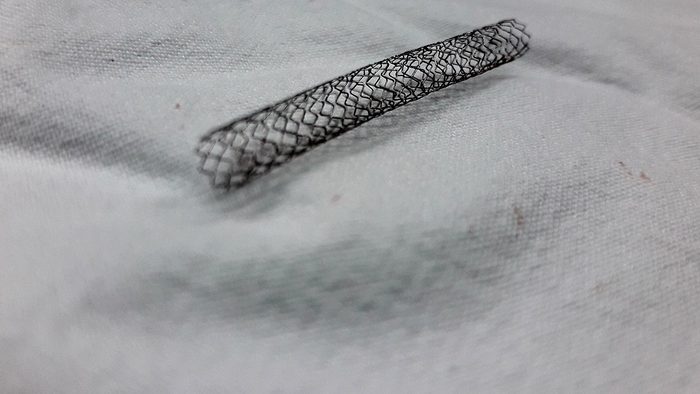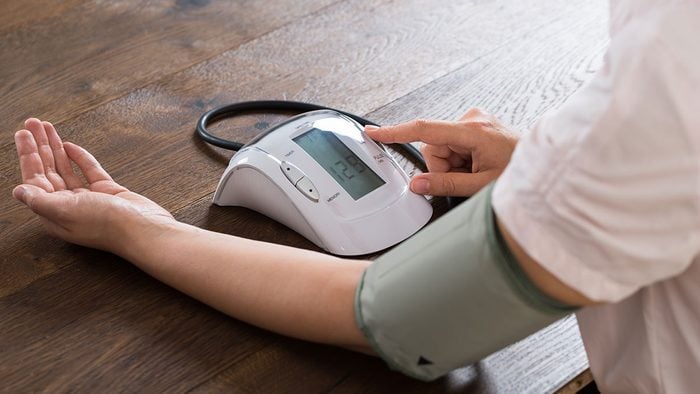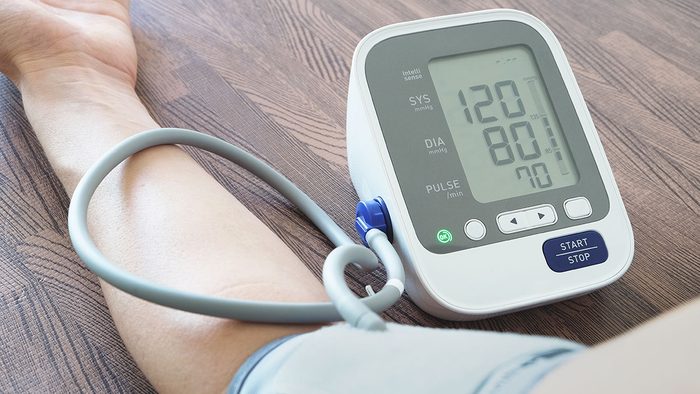
Overweight? I may not discuss it
When people are massively overweight, it’s an obvious issue. When they’re only moderately overweight, it’s more difficult (to bring it up), because we accept people being a little overweight. It’s harder to tell someone like that they have weight to lose. — Stuart Connolly, MD, director, division of cardiology at McMaster University in Hamilton, Ontario.
Related: If you follow this weekly meal plan, you may just lose weight

Thin people aren’t necessarily in the clear
Pay attention to how much sugar you eat and your blood sugar levels, even if you’re not overweight. Impaired glucose tolerance (higher than normal blood sugar but not high enough to be diabetes) increases your risk of diabetes, which increases your risk of heart disease. This is something people who are naturally skinny don’t pay attention to because they think they don’t need to because they’re skinny. —Monali Y. Desai, MD, cardiologist and founder of online health and wellness company If We Were Family
Related: Here are 5 rules for lowering blood pressure naturally.

Sugar is the real villain in heart disease, not fat
When you eat refined sugar, you create an insulin response that is toxic to blood vessel linings. Most attention seems to be on cholesterol; I don’t know that doctors are checking insulin and A1C levels (measures of diabetes risk, which is closely linked to heart health). —Stephen Sinatra, MD, cardiologist and author of numerous books about heart health, including The Great Cholesterol Myth
Related: 7 facts about heart disease that ca save your life.

Most supplements do nothing for your heart health
Doctors who strongly recommend certain supplements are often the ones selling them in their office. For primary prevention, if you’re not eating fish two to three times a week, then fish oil is probably a good idea. I also recommend vitamin D because 80 percent of U.S. adults are deficient. Those are the only two I take. —Sarah Samaan, MD, cardiologist at The Legacy Heart Center in Plano, Texas and author of Best Practices for a Healthy Heart

If you or your spouse isn’t sleeping well, I want to know
Sleep apnea is a major cause of cardiac events such as heart attack, cardiac arrest, and stroke. If you suspect you have sleep apnea (snoring and feeling exhausted when you wake up are big clues), you should tell your doctor about it. And if your spouse is always nagging you for snoring, that’s an important sign too. —Stephen Sinatra, MD
Related: Here are nine sleep habits and what they say about you.

Had a dramatic pregnancy? Tell me
Preeclampsia is a hidden risk factor for early heart disease. It tells me that there’s an underlying problem with the blood vessels. Young women should recognize it’s important for their doctor to know if they develop it. And most doctors won’t ask a 50-year-old woman about her pregnancy health from 25 years ago. The same goes for rheumatoid arthritis and lupus. Heart attacks are the number one cause of death in these patients, and they need aggressive management of risk factors. —Malissa J. Wood, MD, co-director of the Women’s Heart Program at Massachusetts General Hospital.
Related: Why exercising during pregnancy will benefit your baby in a big way.

Red wine isn’t a cure-all
My patients tell me, “I started drinking red wine” and I say “what for?” They think its good for the heart, but you have to be careful not to overdo it and raise your risk of other health issues. Same goes for dark chocolate. People think that you can eat as much as you want. It is good for you — it lowers blood pressure and has antioxidants — but most people are not eating just that one ounce a day. —Stephen Sinatra, MD
Related: Is red wine really healthy or not?

What makes me mad? Smoking
If someone’s a smoker, they gotta stop. I feel sick when I talk to people who still smoke. It’s never too late to stop. Even quitting in your seventies improves survival. If patients want to do one thing for their health, it would be to stop smoking. —Stuart Connolly, MD

It’s easier for me to prescribe you a drug than to address lifestyle factors
Emotional toxicity is a major cause of heart disease. Depression, heartbreak, and uncontrolled anger are major risk factors. A good cardiologist can see that a patient is suffering from these issues. Many doctors believe in drugs but less in healing the whole person. —Stephen Sinatra, MD
Related: The seven supplements heart doctors take every day.

Stress can be a major contributor
Stress can increase your blood pressure and cholesterol, which can increase your risk of heart disease, so it’s important to learn how to manage it. I recommend patients try using yoga and meditation, among other things, to try to deal with everyday stress from work and family life. —Monali Y. Desai, MD
Related: This common type of stress can literally give you a heart attack.

I can help you save money on meds
There’s been a huge roll-out of generics over the last few years, and this is key for anyone who wants to lower their drug costs. To name a few: Lipitor, Zocor, and Pravachol for cholesterol, and Diovan, and Cozaar for blood pressure. —Sarah Samaan, MD

I should examine your teeth
If you have lots of inflammation in your mouth, it’s a sign your whole body is experiencing an inflammatory response. Patients with gum disease have much more heart disease. I always check my patients’ mouths. —Stephen Sinatra, MD
Related: Eight tips to get you started on an anti-inflammation diet.

Your family history isn’t as bad as you think
People will come in and say “my grandma died of a heart attack when she was 80, so heart disease runs in my family.” That’s not true — everyone has to die of something. We define family history as a cardiac event before age 60 in women and before 50 in men. It’s much narrower than people realize. —Sarah Samaan, MD
Related: Why having family dinner should be your top priority.

You probably don’t need that stress test
People used to start getting them at age 50 and then get them yearly. But a stress test will only pick up blockages of 70 percent or greater. A normal test doesn’t mean you don’t have blockages. There’s no medical reason to have a stress test unless you have symptoms, like chest pain or shortness of breath, or an abnormal EKG. It’s become a patient security blanket, and many insurance companies no longer cover them (for preventive reasons). —Sarah Samaan, MD

And that stent may not be necessary either
If a blockage is not causing symptoms or a reduction in blood flow, then it doesn’t need to be stented. In the absence of a severe blockage, treating with medication is just as good. And once you do a stent, then you need to do another, and the problem can proliferate. —Malissa J. Wood, MD
Related: The top questions about high blood pressure — answered.

It makes me happy when you come in with questions — and a family member
The best time to get my attention is the first few minutes of the appointment, before I start the physical exam. That’s when you need to bring up the things that are bothering you. I also like when you have a family member or friend to help. You may be hearing hard news and walk away with mixed messages. —Malissa J. Wood, MD
Related: These make ahead meals will save you more than time — it will save your mind.

Hypertension is a major danger for your heart
A healthy lifestyle is key (to preventing hypertension). Reduce salt intake when you can — cheeses, many soups, deli meats, and takeout are all high in sodium. Sleep quality is important — at least six hours of uninterrupted sleep at night is recommended. —George L. Bakris, MD, Professor of Medicine at University of Chicago, School of Medicine, Merck Manuals author
Related: Five butter substitutes that are better for you heart.

Learn your risk for hypertension
Hypertension can persist for years without any noticeable symptoms. Hypertension is more common as we age — even if a person’s blood pressure is normal at age 55, he is still 90 percent more likely to develop hypertension later in life. Check your family history! You are more at risk if your grandparents, parents or aunts and uncles have high blood pressure. A sedentary lifestyle, excess alcohol, and stress all put you at a higher risk for hypertension. —George L. Bakris, MD
Related: Here’s everything you need to know about hypertension.

I care more about your blood pressure at home than in the office
I see a lot of white-coat hypertension (where blood pressure is elevated in the office but normal at home). If patients are surprised by their blood pressure number, I’ll retest it or ask them to record it at home for a week and bring in their readings. This way if it is high, they’re more motivated to work to lower it. —Sarah Samaan, MD

Get an accurate blood pressure reading
Before your blood pressure is checked at the doctor’s office, sit with your legs uncrossed and your back fully supported and rest for five minutes. Then roll up your sleeve and rest your arm on a table or arm rest. The room should be silent and you should not be talking, listening to music or watching TV. —George L. Bakris, MD
Related: This is exactly what the numbers mean when you get your blood pressure checked.

Please tell me the truth: Do you have erectile dysfunction?
Erectile dysfunction is also a marker of blood vessel disease. The small blood vessels are a barometer of what goes on in the large blood vessels. My own father found out that he had a blockage in his neck when he went in for a prescription for [ED]. —Malissa J. Wood, MD

Heart disease is a slippery slope
Prevention is key. The critical thing about heart disease is this: You are born with the best-shaped, most efficient heart you will ever have. If you do things that stress your heart, it can cause your heart to change its shape a little in response. When this shape change occurs, it makes the heart work less efficiently, which stresses it further. This causes the shape to change more. The next thing you know, a person can find themselves on a fast downward spiral. —Christopher Hanifin, PA-C, faculty, Seton Hall University
Related: How to manage your heart attack risk, according to a holistic nutritionist.

Experiencing heart palpitations? Use your judgement
Heart palpitations are a feeling that people variably describe as skipped beats, hard beats, fluttering, or pounding. Most commonly, they last seconds to minutes. They are one of the most common complaints cardiologists see. They are usually benign and do not predict heart problems but can sometimes be associated with more serious problems. The list of causes is long. Usually they represent extra beats (called premature contractions by doctors). Caffeine, stress, and anxiety are common underlying causes. If the person is concerned, they should see a doctor to be evaluated, as reassurance often helps make the symptoms better or resolve. If the symptoms are persistent, last more than five minutes, cause the feeling of passing out, or if the person has a history of heart disease, they should be seen by a doctor sooner rather than later. —Dr. Todd Hurst, MD, Center Director for Cardiovascular Health at Banner University Medical Center in Phoenix, AZ
Related: Learn the surprising symptom that could be a sign of a heart attack in women.

If it starts taking you longer than usual to do certain activities, that could be a warning sign
Keep track of how long it takes you to walk or exercise a certain distance. As people age, many people think they’re slowing down because of “old age,” but actually they’re slowing down because of undiagnosed heart disease. For example, I ask patients to keep track of how long it takes them to walk one mile; from year to year there should not be dramatic changes in how long it takes. If there are, this may be a sign you’re developing heart disease. —Monali Y. Desai, MD
Related: The dance fitness class that doesn’t feel like exercise.

I treat people on a case-by-case basis
One of the most important — and challenging — things to do as a cardiologist is to determine a patient’s risk for future heart problems like heart attack, heart failure, and even death. The amount of risk… is the most important factor in deciding the best treatment. All treatments have potential side effects, so if a patient is at low risk, it makes sense to be conservative in choosing treatment options. However, if a patient is at high risk, it may make sense to recommend more aggressive treatment options. Decisions about everything from who should be prescribed high blood pressure and cholesterol medications all the way to who should undergo potentially risky procedures such as a heart catheterization or insertion of an implantable cardiac defibrillator are all based primarily on the future risk for the patient. By understanding your risk and how it is determined, you will better understand your physician’s recommendations. —Dr. Todd Hurst, MD
